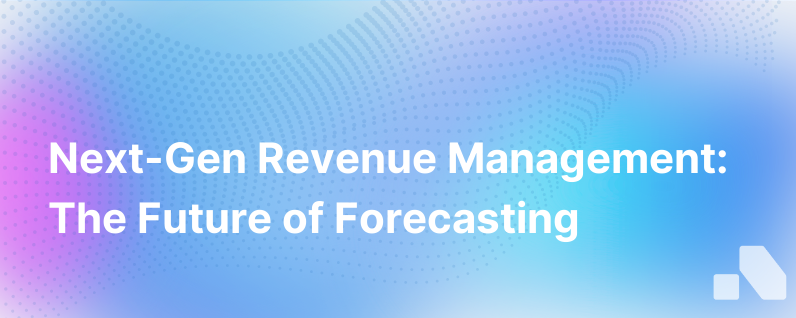Future Of Forecasting Next Generation Revenue Management
Published on August 3, 2023 by David Zhang
For businesses remaining competitive in today’s rapidly changing economic landscape hinges on the ability to predict and adapt to future trends. One area undergoing significant transformation is revenue management—the strategic allocation and pricing across a company’s portfolio to maximize profits. Advancements in technology, the proliferation of data, and changes in consumer behavior are driving an evolution like never before, and understanding this shift is crucial. Here is a close examination of the future of forecasting and next-generation revenue management.
The Evolution of Revenue Forecasting
Historically, revenue forecasting has relied on past trends and linear projections. Financial analysts would pore over historical data, considering factors like seasonal trends, economic factors, and company performance to make predictions for future performance. While effective for steady markets, this approach leaves much to be desired in the face of volatility and change, and it often fails to consider the nuances of consumer behavior and real-time market shifts.
However, we are on the brink of a transformation in forecasting methodology—one that embraces complexity and continuous change, leverages cutting-edge technology, and adopts a more granular and dynamic view of the market.
Next-Generation Revenue Management: A Data-Driven Approach
The most striking evolution in revenue forecasting lies in the utilization of big data and artificial intelligence (AI) to gain insights and make more accurate predictions. Companies now can mine vast amounts of data in real time, including transactional history, web analytics, social media sentiments, and even weather forecasts, to refine their revenue management strategies. AI and machine learning algorithms chew through this data, detecting patterns, predicting trends, and anticipating changes that human analysts may overlook.
Real-time Data Analysis
The future of forecasting is real-time. With advancements in IoT and cloud computing, companies are capturing and analyzing data instantaneously. This means that rather than waiting for quarter-end reports, revenue management systems can incorporate live data feeds to update forecasts on the fly, allowing businesses to make informed decisions in the moment.
Enhanced Predictive Accuracy
Through AI and machine learning, revenue management systems are not only analyzing larger datasets but they are also learning from them. They're getting smarter over time, increasing the accuracy of their predictions. Semantics analysis, for example, interprets social media chatter, reviews, and customer feedback, detecting shifts in consumer sentiment that might signal a need to adjust pricing or promotions.
Dynamic Pricing Strategies
Dynamic pricing, already prevalent in industries like hospitality and airlines, will become more widespread. Algorithms take into account real-time supply and demand, competitor pricing, and even individual customer buying history and preferences to adjust prices. The result is a finely tuned balancing act where prices shift to reflect the interplay of market factors and optimize revenue.
Customization and Personalization
The intersection of revenue management and customer relationship management is where the next revolution lies. Here, personalization and customization play a major role. Businesses will increasingly adopt strategies that tailor pricing and promotions to the individual customer, informed by detailed customer profiles built using AI analysis of their behavior patterns, preferences, and past interactions.
Subscription Models & Service As A Product
With the rise of the Subscription Economy, revenue forecasting now includes predicting customer churn and lifetime value. Granular tracking of usage patterns will help businesses tweak their offerings to retain subscribers, while predictive models will pinpoint the likelihood of customer turnover, allowing companies to intervene proactively.
Increasing Role of Scenario Planning
Next-generation revenue management systems are able to process innumerable what-if scenarios to gauge potential outcomes and prepare for numerous possibilities. They can simulate the impact of market changes, economic shifts, or new competitor entries, helping companies to not just react to these changes, but proactively plan for them.
Integrating External Factors
The economic landscape is affected by a wide range of external factors, from geopolitics to environmental events. Next-generation revenue management systems are incorporating these broader datasets to provide more comprehensive forecasting. This extends to understanding regulatory impacts, tariffs, and environmental changes, providing a more holistic view of how externalities affect the revenue stream.
Ethical AI & Compliance
As AI becomes more involved in revenue management, issues around data privacy, ethical AI, and compliance gain prominence. Ensuring that forecasting models aren't perpetuating biases, respecting customer data, and complying with regional regulations will become integral parts of revenue management practices.
The Human Element
While technology dramatically enhances revenue forecasting, the human element remains crucial. Decision-makers leveraging their experience to interpret AI-driven insights add context that algorithms alone may miss. Also, human intuition plays a key role in understanding nuanced market dynamics where even vast datasets might not provide clear guidance.
Conclusion
In the pursuit of competitive advantage, future-proofing your revenue management strategy isn't just an option—it’s a necessity. The next generation of forecasting tools will empower businesses to capture and analyze data at unparalleled levels, predict with greater accuracy, and manage revenue with a sophistication that was once the stuff of science fiction. Companies that embrace these advanced tools and techniques will stand at the forefront of economic innovation, ready to capitalize on opportunities in the ever-fluctuating global marketplace.
While businesses like Aomni provide AI-based platforms to streamline and enhance sales strategies, the marriage of technology with strategic human insight paves the way for a new era in revenue management—one that offers remarkable precision and adaptability in forecasting the ebbs and flows of a dynamic commercial world.